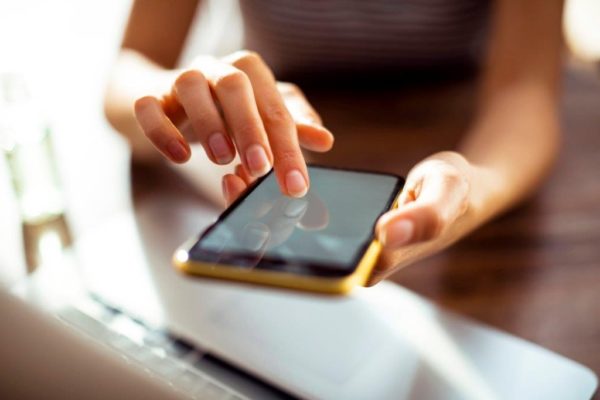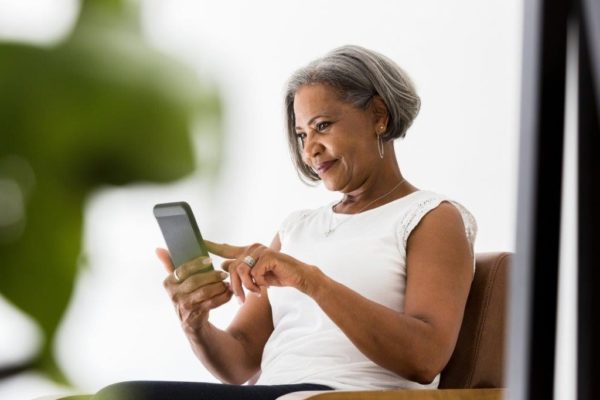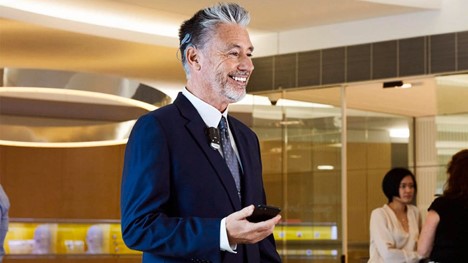We pulled together some apps to help you with everything from listening to audio books to transcribing live speech to help with everyday conversations. Find out more here.
Did you know that there are a lot of mobile apps designed to help you live more confidently with hearing loss? And that using self-guided apps on your smart phone can actually help build your listening skills?
Apps are great because they give you easy access to knowledge, tools and strategies to better manage your hearing loss.
Research shows that having access to information, tools and activities that are easy to use and understand that are shaped to your individual needs, can make a real difference.1
By having them in the palm of your hand, you can use them whenever you have some down time – whether you’re relaxing at home with a cup of coffee or you’re waiting to pick up a child from sports practice.
Cochlear™ CoPilot2 is a great app to try. It’s full of practical information, tips and interactive activities so you can practice word recognition to improve your listening skills at home plus loads more. The app is free and easy to use – just download it from the Apple® app store.3
To help you navigate other apps available, we have put together this list to help you get started based on your needs:
1. Practice listening
There are a number of easily downloadable audio book apps to help you practice listening skills. Try Audible (a subscription service) to download and listen to stories. Libby and Overdrive are apps that let you borrow books online from your local library.
Music apps like Cochlear’s free Bring Back the Beat app offer interactive activities to help you to reconnect with music, starting with simple notes and instruments and building up to more complex melodies.
TED Talks™ are useful because of the huge variety of topics, voices and accents. All talks have optional captioning which you can follow to support your listening.
2. Cope with noisy environments and social distancing
Apps that translate speech into text in real-time on your smart phone can be useful. The accuracy may not always be perfect, but these apps can be very helpful to improve communication where social distancing, facemasks and noise make it difficult. Try these:
- Google’s™ Live Transcribe is an Android™4 app that provides free, real-time, speech-to-text transcriptions to help with everyday conversations. The app can also recognize non-speech sounds and is voice-activated. Live Transcribe shows speech and sounds as text on your smart phone screen. It requires WiFi or a data network connection.
- Notes for iOS. Use Notes on your iPhone® to capture a quick conversation. Open Notes, tap to start your new note, then tap to start voice-to-text transcription.
- Otter.ai is available for both Android and iPhone. It is a subscription-based app, but free plans are available. WiFi or data network access is required.
3. Manage your listening environment
Sometimes background noise can be overwhelming and can threaten to spoil a social event like dinner out with friends or family. Apps and online reviews can also help you discover venues suitable for people with hearing loss. Try these:
- Find customer reviews on noise levels (as well as the food) when choosing a restaurant using TripAdvisor® and Zagat™.
- SoundPrint is a mobile app that takes a decibel reading and averages a location’s readings so you can view noise levels when choosing a venue.
4. Safety and sound awareness
- iPhone Sound Recognition Alerts allow your iPhone and iPad® to alert you to sounds, such as running water, appliances and doorbells. It can also identify shouting voices or a baby crying, and can distinguish between alarms for fires, smoke and sirens.
- Android Sound Notifications allows your Android phone to alert you to sounds via a push notification, a flash from your camera light, or by making your phone vibrate. Google says Sound Notifications can identify 10 sounds – from sirens and a dog barking to smoke alarms and water running among others.
5. Rehabilitation at home
Taking charge of your hearing journey is a key component of successful rehabilitation.5 This is especially important as we don’t have access to hearing health experts 24/7, so we need the right tools to make self-care possible.
Cochlear CoPilot is our self-directed app designed for iPhone that provides interactive activities to build listening and communications skills for everyday life.
The app is packed with features to help you including activities to help you build listening confidence, explainers to help you live with hearing loss in the real-world – from communicating in the workplace to enjoying concerts, travel, social occasions, and more.
Get started today! Download Cochlear CoPilot for free from the Apple App Store.
- Caposecco A, Hickson L, Meyer C. Hearing aid user guides: suitability for older adults. Int J Audiol 2014;53 01:S43–S51. [PubMed]
- For complete smartphone compatibility information, please visit www.cochlear.com/compatibility
- Apple, the Apple logo, Apple Watch, FaceTime, Made for iPad logo, Made for iPhone logo, Made for iPod logo, iPhone, iPad Pro, iPad Air, iPad mini, iPad and iPod touch are trademarks of Apple Inc., registered in the U.S. and other countries. App Store is a service mark of Apple Inc., registered in the U.S. and other countries.
- Android is a trademark of Google LLC. The Android robot is reproduced or modified from work created and shared by Google and used according to terms described in the Creative Commons 3.0 Attribution License. Google Play and the Google Play logo are trademarks of Google LLC.
- Convery E, Keidser G, Hickson L, Meyer C. The relationship between hearing loss self-management and hearing aid benefit and satisfaction. Am J Audiol 2019;28(2):274-284. doi:10.1044/2018_AJA-18-0130


